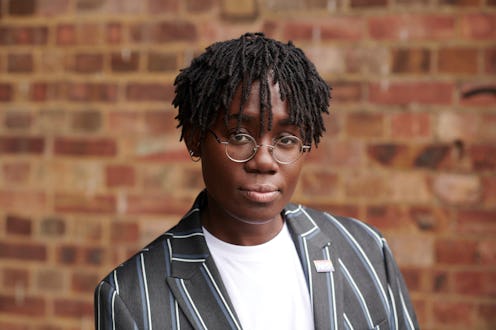Life
Dr. Ronx On What It's Like To Try & Answer The Question: "Is Covid Racist?"
Their new Channel 4 documentary investigates why BAME communities have been worst hit by coronavirus.

Dr. Ronx Ikharia is fully aware that the title of new Channel 4 documentary Is Covid Racist? is "very provocative". But, they tell Bustle, it’s all for good reason. Alongside experts, the emergency medical doctor hosts a full investigation into why the coronavirus has disproportionately affected BAME frontline workers in the UK, and pays tributes to those who have lost their lives.
In the early stages of the pandemic in the UK, government research revealed that the figures were skewed to disproportionally affect those from BAME communities. As it was widely reported in April, the first 10 NHS doctors to die of COVID-19 in the UK were from Black, Asian, and Minority Ethnic backgrounds. Channel 4 expands on those early stats to report that "over 60% of NHS frontline health workers who have died of COVID-19 are also people of colour, despite making up only 20% of the NHS workforce."
Is Covid Racist? deep-dives into the socioeconomic inequalities that may have caused this to happen. Though recent government research dismisses structural racism as a contributing factor, Dr. Ronx allows the "hard facts" to speak for themselves in the Channel 4 documentary. Here, they talk us through the investigations, filming, and what this year has really been like for an NHS doctor.
How do you even begin to answer the documentary's title question: 'Is Covid racist'?
Fortunately, the production team were absolutely amazing, and they broke it down into five distinct themes: genetics, pre-existing medical conditions, wealth, health, and institutional racism. The documentary is only 40-minutes long, and there’s a lot to talk about – talking to people with lived experience, survivors of COVID-19, and then the experts enable it to all to come together.
What did you learn during filming?
I learned a lot... I didn’t know the first 10 doctors to die were from Black and brown communities, or at one point, during the early stages of the pandemic, that 20% of all nurses who died were Filipino.
The show is also a tribute to the frontline workers who lost their lives. How did you respond to that?
Due to the nature of filming, I didn’t get to meet the families of those who have passed from COVID-19. I can tell you that I’ve never felt so sad about people I have not met before. This virus and all of the issues that it has thrown up has really disheartened me.
If we think about Belly Mujinga, who was spat at while working at Victoria station, and went on to die from COVID-19, and Mary Agyeiwaa Agyapong, the 28-year-old nurse who died after contracting COVID-19 and pneumonia.... there are so many stories that lead me to question, could this have been prevented? Our government is going to have to do a retrospective review because we are going to have another pandemic, and we need to learn from this one.
Has there been any opposition to the documentary?
There hasn't, actually. People know that they can’t fault the statistics. They know Black and brown people are disproportionately affected. It’s the lack of government response to these statistics that I find difficult. For me, the concern is more about the action, and the things that people are doing to reduce these inequalities, and save the lives of Black and brown people.
What would you say to viewers of the programme?
I want people to know that when we speak on race or racial biases this isn’t a personal dig on non-people of colour. This is our lived experiences of health inequalities, and living and working in the pandemic, speaking up on the issues that affect us.
I want people to know that we live in a community, a global community, and everything we do – from wearing a mask in public places to social distancing, to washing our hands, to downloading the test and trace app, and considering getting the vaccine — all of these things are really important.
Has the pandemic given you a new appreciation for your job?
I went through a real rollercoaster in this pandemic. Never once did a doctor think they’d be working and living within a pandemic, and see people coming in from an illness that is so easily passed on.
I have never been so proud of the NHS as I am now. I’ve never been so close to my colleagues, and the kindness from strangers was everything we needed. And even though the clapping on Thursdays got a bit tiresome, the sentiment behind it was wonderful. This pandemic has thrown up some amazing stuff, such as community, togetherness, and survival. But it has also highlighted how disparities still exist within our communities, which are grounded within race.
Is Covid Racist? airs on Channel 4 on Monday Nov. 23 at 9 p.m.